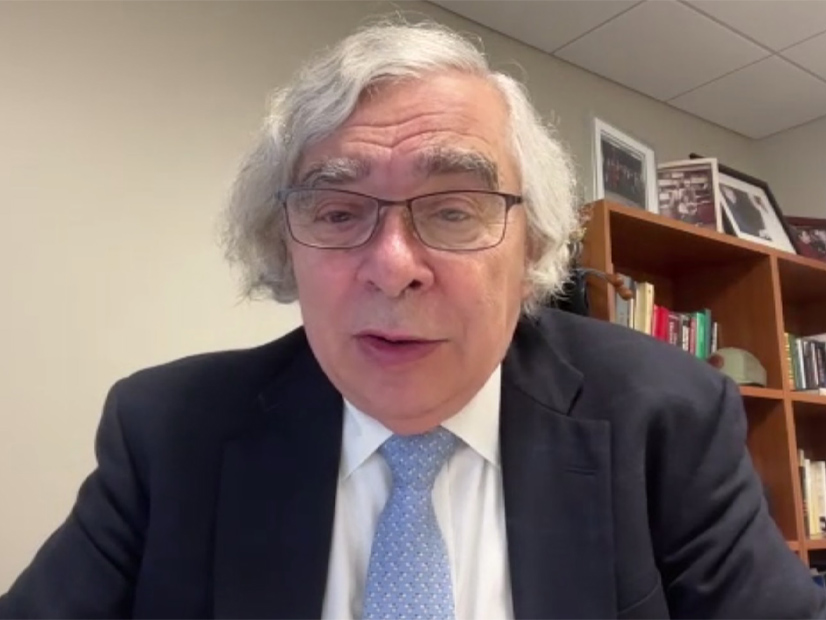Minnesota received kudos for promoting a clean energy workforce during an EFI Foundation webinar.
Minnesota’s economy is reaping the benefits of promoting a clean energy workforce, said state regulators, union leaders and utility representatives in a webinar.
EFI Foundation, a D.C.-based nonprofit dedicated to furthering the clean energy transition, held Minnesota up as a success story for other Midwestern states to follow during its Oct. 2 webinar on clean energy workforce development.
“Minnesota is a great example of making some real progress,” EFI Foundation CEO and former U.S. Energy Secretary Ernest Moniz said.
Minnesota Department of Commerce Deputy Commissioner for Energy Pete Wyckoff credited the Inflation Reduction Act and the Infrastructure Investment and Jobs Act for greasing the wheels to create quality jobs to build the next-generation workforce in the state.
He said Minnesota is a key player in “building out and rebuilding our manufacturing sector.”
Minnesota Public Utilities Commission Chair Katie Sieben said in the past six to seven years, the commission has gotten better at including community and workers’ voices in its dockets and decision-making. She said the commission in some cases has required utilities to file worker transition plans when fossil generation is retired.
Sieben said state regulators now ask developers if they plan to use local labor in their projects.
“In Minnesota, we want the workers to come from Minnesota. We don’t want them to come from Texas and Florida, no offense to those states. … We’re asking how we make these projects Minnesota-based,” Sieben said.
Wyckoff also said Minnesota’s legislature redesigned its permitting process at the state level. He said he thinks projects now can move faster “without compromising the public input.”
“If the federal folks want to know how they can do this, they can give us a call. Sometimes we lead and sometimes we follow,” Wyckoff joked.
Sieben said Minnesota sees its infrastructure is aging and needs “intense investment” in transmission to achieve clean energy targets.
Wyckoff said federal funds are key to reducing “energy activation costs” and accessing the cheaper energy that’s on the other side of the energy transition.
Siebe noted that federal funds are at play for the reinventing of the Sherburne County Generating Station, where Xcel Energy plans an iron-air battery system pilot and the 710-MW Sherco Solar project, set to become Minnesota’s largest solar facility.
Xcel Energy Vice President for Regulatory Policy Bria Shea said her utility contemplated how to take advantage of the significant interconnection rights and existing infrastructure of the coal-fired Sherco plant.
She said the first 260 MW of the expansive solar farm should go into service next week.
Minnesota Power Vice President of Regulatory and Legislative Affairs Jennifer Cady said an energy transition that leaves behind workers is “simply neither just nor sustainable.”
Cady said Minnesota Power built three solar farms using panels from Heliene’s facility in Mountain Iron, Minn., to help the state bounce back economically from the pandemic. Cady added that Minnesota Power has contracted with local farmers to use sheep for vegetation management around the panels.
Minnesota Power now has supplier preferences for local companies, Cady said. The company recently announced it plans to build two utility-scale solar projects in northern Minnesota by 2027, one of which will be at the Boswell Energy Center, Minnesota Power’s last active coal plant.
“I know new technologies can almost always be disruptive to local jobs,” EFI Foundation Distinguished Associate David Foster said. Foster said it’s important to showcase that Minnesota’s brand of industrial collaboration paired with federal support is driving job creation in the state.
Rick Martagon, executive director at Minnesota building trades apprenticeship preparatory program Building Strong Communities, said the program this year graduated its largest cohort yet at 106 of 125 attendees.
Joe Fowler, business manager at Laborers’ International Union of North America (LIUNA), said good relations between laborer organizations and utilities can help ease the disruption of the energy transition.
“It’s saying, ‘How do we make sure those careers continue?’” he said.
“There are new opportunities to replace the old ones if people are willing to be retrained,” he said, adding that the economic benefits of good jobs are multiplied when laborers spend dollars within their communities.





